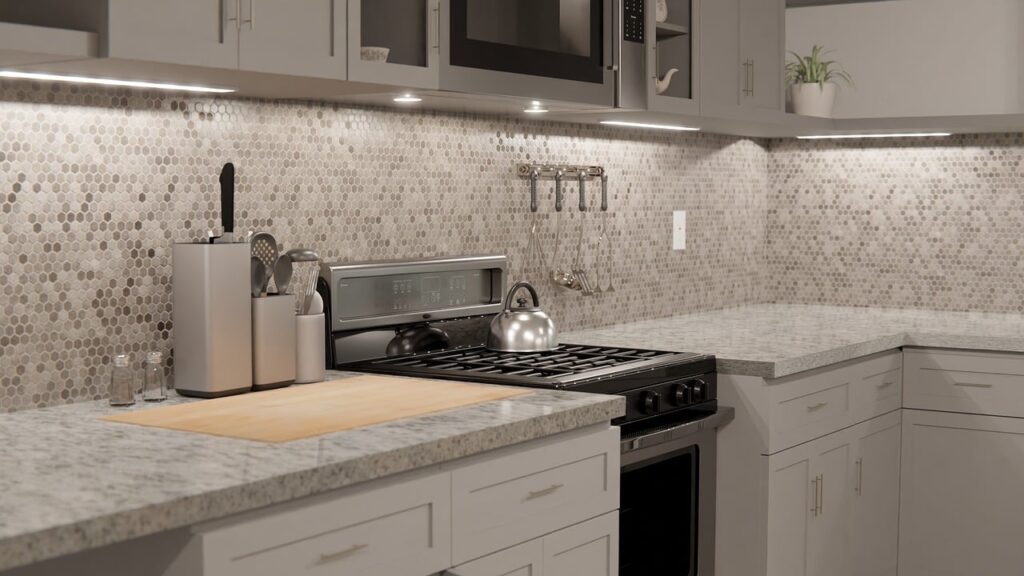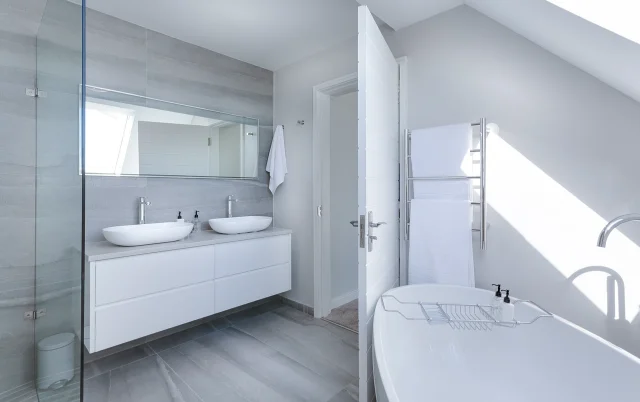Get rid of urine smell in the bathroom, once and for all. Keeping a house clean can feel like a constant battle. It is like a boss fight of its own. The toughest enemy? That persistent urine odor that sometimes decides to take up permanent residence in our porcelain thrones. But fear not! Through countless skirmishes (and some helpful online intel), you will find a battle plan in this article to vanquish that nasty bathroom stench once and for all.
Contents
- 1 Understanding the Causes of Urine Odor in the Bathroom
- 2 Natural and Eco-Friendly Cleaning Solutions
- 3 Preventive Measures to Keep Your Bathroom Fresh
- 4 Commercial Products vs. DIY Solutions
- 5 Identifying and Addressing Pet-Related Urine Smells
- 6 Conclusion
- 7 Frequently Asked Questions
- 7.1 What are some natural methods for eliminating urine odor in the bathroom?
- 7.2 How can regular cleaning help in preventing urine smell in the bathroom?
- 7.3 Can household items like vodka be used to combat bathroom odors?
- 7.4 Why is it important to fix leaks in the bathroom to control urine odor?
- 7.5 What role does educating household members play in maintaining a fresh bathroom?
- 7.6 How can I address pet-related urine smells in the bathroom?
Key Takeaways
- Regular cleaning and maintenance are crucial for preventing and eliminating urine odor in the bathroom.
- Natural and eco-friendly solutions like baking soda, white vinegar, and essential oils can effectively neutralize urine smells.
- Educating household members on proper toilet etiquette and fixing leaks promptly can help keep the bathroom fresh.
- Commercial air fresheners may mask odors temporarily, but understanding the pros and cons of various products is essential for long-term odor control.
- Addressing pet-related urine smells involves pinpointing the origin, using DIY remedies, and maintaining a pet-friendly environment.
Understanding the Causes of Urine Odor in the Bathroom

The Chemistry of Urine and Resulting Smells
Urine is a complex solution, primarily composed of water, urea, and various waste products. When left uncleaned, bacteria begin to break down urea into ammonia, leading to the characteristic strong odor often associated with bathrooms. This process is accelerated in warm, moist environments, making regular cleaning crucial.
- Ammonia production: Bacteria decompose urea into ammonia.
- Warmth and moisture: These conditions speed up the bacterial activity.
Ammonia’s pungent smell is a clear indicator of the need for more frequent or thorough cleaning.
Understanding the chemistry behind urine odor is essential for effectively targeting and eliminating it. Simple steps can significantly reduce the presence of these unwanted smells.
Common Sources of Urine Odor in Domestic Bathrooms
The persistent presence of urine odor in domestic bathrooms can often be traced back to a few common sources. Unclean toilets are a primary culprit; urine contains ammonia, which can emit a strong smell if not cleaned regularly. Another frequent issue is urine leaks, where urine seeps into hard-to-reach areas like toilet seat hinges or beneath the tank.
- Toilet seat hinges: Often overlooked during cleaning.
- Beneath the tank: A hidden spot where urine can accumulate.
- Floor around the toilet: Can harbor urine splashes and drips.
Regular cleaning and addressing leaks promptly are essential to prevent urine from becoming a persistent problem. Educating household members on proper toilet etiquette, such as lifting the seat to avoid splashes, is also crucial in maintaining a fresh bathroom environment.
The Role of Humidity and Ventilation in Odor Persistence
High levels of humidity in the bathroom create the perfect environment for odors to thrive. Proper ventilation is key to preventing this. Without it, moisture lingers, allowing urine smell to persist and even intensify.
- Ensure regular airflow by using exhaust fans
- Open windows to reduce moisture levels
- Consider dehumidifiers in particularly damp bathrooms
Maintaining low humidity levels and good ventilation can significantly reduce the presence of unwanted odors.
Remember, cleaning is just the first step. To keep odors at bay, focus on the airflow in your bathroom. Dust and debris in vents can trap and hold odors, making professional duct cleaning and filter changes essential for a fresh-smelling space.
Natural and Eco-Friendly Cleaning Solutions

Harnessing the Power of Baking Soda
Baking Soda: A Natural Odor Neutralizer. Sprinkle a generous amount of baking soda in the toilet bowl and let it sit for a few hours before flushing to effectively combat urine smell.
Baking soda can also be used to create a paste for treating urine odors on various surfaces. Mix 3 tablespoons of baking soda with 2 tablespoons of dish soap and 3 tablespoons of hydrogen peroxide. Apply the paste to affected areas and let it sit before rinsing.
For a refreshing touch, combine baking soda with a few drops of essential oils. Sprinkle this mixture onto carpets or rugs to eliminate pet odors and leave a pleasant scent.
White Vinegar: A Versatile Deodorizer
White vinegar is a powerhouse in the battle against urine odors. Its acidic nature neutralizes bacteria, effectively eliminating the source of the smell.
- Mix equal parts of white vinegar and water in a spray bottle.
- Spray the solution on the affected area.
- Allow it to sit for at least 10 minutes before wiping it off with a clean cloth.
While white vinegar is highly effective, it may require multiple applications for stronger odors.
The simplicity and accessibility of white vinegar make it a go-to remedy for urine smells. It’s not only cost-effective but also a safe choice for many indoor surfaces.
Essential Oils for a Pleasant Aromatic Experience
Essential oils offer a natural way to keep your bathroom smelling fresh and clean. With their potent aromatic properties, they can neutralize unpleasant odors effectively.
Eucalyptus and lemon oils are particularly known for their odor-fighting abilities. A few drops added to a spray bottle with water can serve as a simple yet powerful air freshener. Alternatively, placing a bowl of water with a blend of your favorite oils can act as a passive deodorizer.
- Lavender: Calming and relaxing
- Peppermint: Invigorating and cooling
- Tea Tree: Antimicrobial and fresh
Remember, a little goes a long way with essential oils. Start with a few drops and increase as needed to avoid overwhelming the senses.
For those sensitive to strong scents, it’s important to choose oils that are pleasant but not overpowering. Experimenting with different combinations can help you find the perfect balance for your bathroom’s aroma.
Preventive Measures to Keep Your Bathroom Fresh

Regular Cleaning Routines to Combat Odor Build-Up
Regular cleaning routines are essential in maintaining a fresh bathroom environment. By frequently cleaning toilets, you prevent urine traces from developing into a more significant problem.
- Use a toilet brush: Scrub the bowl regularly to remove any lingering urine.
- Flush after use: Ensure that everyone flushes immediately after use to minimize odor.
- Clean hard-to-reach areas: Pay special attention to the base and back of the toilet where urine can collect.
Consistency is key. Establishing a regular cleaning schedule can significantly reduce the chances of odor build-up.
In addition to cleaning, proper ventilation is crucial. It helps to dissipate odors and prevents them from reoccurring. Remember, tackling odors is not just about cleaning; it’s about creating an environment where smells are less likely to persist.
Fixing Leaks to Avoid Hidden Urine Accumulation
Leaky toilets are a common culprit for persistent urine odors. Fixing leaks promptly can prevent urine from seeping into hard-to-reach areas, where it becomes a challenge to clean. Areas often affected include the base of the toilet, the toilet seat hinges, and beneath the tank.
- Check for leaks regularly
- Tighten loose fittings
- Replace worn out components
By addressing leaks, you not only maintain the structural integrity of your bathroom fixtures but also eliminate a potential source of odor.
For a leak-free bathroom, it’s essential to conduct periodic inspections and repairs. This proactive approach ensures that urine doesn’t accumulate in concealed spaces, effectively banishing odors before they can take hold.
Educating Household Members on Proper Toilet Etiquette
Instilling proper toilet etiquette is crucial for maintaining a fresh bathroom environment. Encourage family members to lift the seat before use to prevent splashes and ensure cleanliness. Remind everyone to flush thoroughly after each use, as lingering waste can contribute to unwanted odors.
- Lift the seat: Avoid urine splashes on the seat.
- Flush thoroughly: Leave no trace behind.
- Regular cleaning: Make it a group effort.
- Address leaks: Prevent hidden urine accumulation.
Proper toilet etiquette is not just about cleanliness; it’s about respect for shared spaces.
Educating household members can be as simple as setting clear guidelines and leading by example. A clean and odor-free bathroom is a collective responsibility, and every contribution matters. By working together, we can ensure our bathrooms remain welcoming and comfortable for all.
Commercial Products vs. DIY Solutions

Pros and Cons of Store-Bought Air Fresheners
Store-bought air fresheners offer a convenient solution to combat urine odors in the bathroom. They are readily available and come in a variety of fragrances to suit different preferences.
Pros:
- Instantly masks odors
- Wide range of scents
- Easy to use
Cons:
- May contain chemicals that can be harmful if inhaled
- Temporary fix; does not eliminate the source of the odor
- Can be costly over time
While air fresheners can provide immediate relief, they often do not address the underlying issue. Repeated use may be necessary to maintain a fresh-smelling bathroom, which can add up in cost. Moreover, the presence of chemicals in some products raises concerns about long-term health effects.
It’s important to consider both the effectiveness and safety of air fresheners when choosing how to tackle bathroom odors.
For a more permanent solution, addressing the root cause of the smell is essential. Plumbers use smoke tests, CCTV cameras, and High Pressure Water Jetting to detect leaks and clear blockages. Regular inspection and maintenance are crucial to prevent sewage smells.
Evaluating the Effectiveness of Homemade Remedies
Homemade remedies for urine odor removal offer a balance between efficacy and safety. Cost-effectiveness is a major advantage, as these solutions are often made with common household items. For instance, a baking soda paste can be highly effective on various surfaces, including carpets and furniture.
Pros and Cons of Homemade Remedies:
- Pros:
- Affordable and accessible ingredients
- Safe for pets and the environment
- Can be used on multiple surfaces
- Cons:
- May require multiple applications
- Less potent than commercial products
While not as powerful as professional cleaners, a bit of extra effort can significantly enhance the performance of DIY solutions.
Evaluating the effectiveness of homemade remedies involves considering their safety, cost, and the need for repeated use. The simplicity of ingredients like white vinegar ensures safety for both pets and humans, while the low cost appeals to budget-conscious individuals. However, the potential need for repeated applications is a trade-off to consider.
When to Choose Professional Cleaning Products
While DIY solutions are often sufficient for regular maintenance, certain situations call for the expertise and efficiency of professional cleaning products. When persistent odors resist home remedies, it’s time to consider stronger, specialized options.
- Professional cleaning services possess advanced tools and potent products designed to eliminate tough odors. Steam cleaning, for example, uses heat to dismantle odor molecules, reaching areas that are otherwise difficult to clean.
- Specialized cleaning products often contain enzymes that target and break down the ammonia in urine, neutralizing the smell effectively. These products are particularly useful when dealing with stubborn odors that household ingredients cannot conquer.
Regular professional carpet cleaning using steam cleaners and dry cleaning methods is essential for maintaining carpet hygiene. DIY cleaning with proper preparation and care can also be effective.
Remember, while professional products may come at a higher cost, their ability to restore freshness to your bathroom can be unparalleled. Evaluate the severity of the odor and the success of your previous attempts before investing in professional solutions.
Identifying and Addressing Pet-Related Urine Smells

Pinpointing the Origin of Pet Urine Odors
Identifying the source of pet urine odors is crucial for effective elimination. Look for stains or discolorations on floors, rugs, and around the toilet area. Pets often return to the same spot, so check for patterns of repeat offenses.
- Use your nose to guide you to the affected areas.
- Inspect hidden spots behind the toilet or in corners.
- Consider using a UV light to reveal older, dried stains.
Once the origin is pinpointed, cleaning can be targeted more effectively. Remember, the goal is to neutralize the odor, not just cover it up. A combination of cleaning and preventive measures will ensure a fresher bathroom environment.
Consistent and thorough cleaning is key to preventing pet urine odors from taking hold.
DIY Remedies for Pet Accidents
When your furry friend has an accident, quick action is key to preventing lasting odors. Start by blotting up as much urine as possible before it seeps deeper into flooring.
Homemade solutions can be both effective and safe for your pets. A popular choice is a mixture of white vinegar and water, which neutralizes odors without the use of harsh chemicals. For tougher stains, baking soda can be applied to the area after cleaning to absorb any residual smell.
Consistency is crucial. Reapply homemade remedies as needed until the odor is completely gone.
Remember, patience and persistence will go a long way in keeping your bathroom smelling fresh. Here’s a simple guide to tackle pet urine smells:
- Blot the area with paper towels or a clean cloth.
- Mix equal parts of white vinegar and water, apply to the stain, and let sit for a few minutes.
- If the smell persists, sprinkle baking soda over the cleaned area and let it absorb the odor before vacuuming it up.
- For ongoing maintenance, consider a preventive maintenance routine that includes regular checks and immediate clean-up of any new accidents.
Maintaining a Pet-Friendly and Odor-Free Bathroom
Maintaining a pet-friendly bathroom that’s also free of odors is a balancing act. Regular cleaning is essential, especially when pets are involved. Here are some steps to keep your bathroom fresh:
- Clean surfaces immediately after any pet accidents.
- Use enzymatic cleaners to break down urine molecules and neutralize odors.
- Wash pet bedding and any removable bathroom mats regularly.
Ventilation is key to preventing odor accumulation. Ensure your bathroom has adequate airflow to dissipate smells quickly. If possible, install an exhaust fan or keep windows open to aid in ventilation.
Consistency in cleaning and preventive measures will keep pet odors at bay, ensuring a welcoming environment for both humans and pets.
Remember, a clean bathroom is a healthy environment for your pet too. By staying on top of cleanliness and using the right products, you can enjoy a harmonious space that’s comfortable for everyone.
Conclusion
In conclusion, eliminating urine smell in the bathroom is a task that requires a multifaceted approach. By incorporating regular cleaning routines, utilizing natural odor neutralizers like baking soda and white vinegar, and addressing any leaks or areas prone to urine accumulation, you can maintain a fresh and odor-free bathroom. Remember to educate household members on proper toilet use to prevent future issues. With persistence and the right strategies, you can effectively banish those stubborn odors and enjoy a clean, welcoming bathroom environment.
Frequently Asked Questions
What are some natural methods for eliminating urine odor in the bathroom?
Natural methods include using baking soda as an odor neutralizer, white vinegar for its deodorizing properties, and essential oils like eucalyptus and lemon to fight odors and provide a pleasant aroma.
How can regular cleaning help in preventing urine smell in the bathroom?
Regular cleaning prevents urine traces from developing into a problem by removing the ammonia in human urine that can emit a strong odor if left on surfaces for too long.
Can household items like vodka be used to combat bathroom odors?
Yes, vodka can be used to banish bad smells. Mixing vodka with water in a spray bottle and misting it on furniture, curtains, or carpets can trap scent particles and eliminate odors as the alcohol evaporates.
Why is it important to fix leaks in the bathroom to control urine odor?
Fixing leaks is crucial to prevent urine from accumulating in hard-to-clean areas, which can contribute to persistent odors in the bathroom.
What role does educating household members play in maintaining a fresh bathroom?
Educating household members on proper toilet etiquette, such as lifting the seat to avoid splashes, helps prevent urine from reaching areas where it can cause odors.
To address pet-related urine smells, pinpoint the origin of the odor, use DIY remedies like vinegar and water for cleaning, and maintain a routine to keep the bathroom pet-friendly and odor-free.


